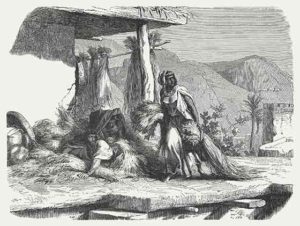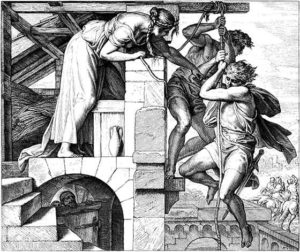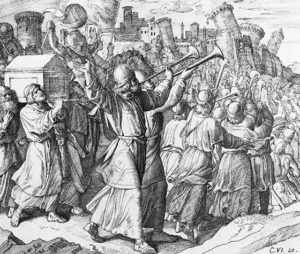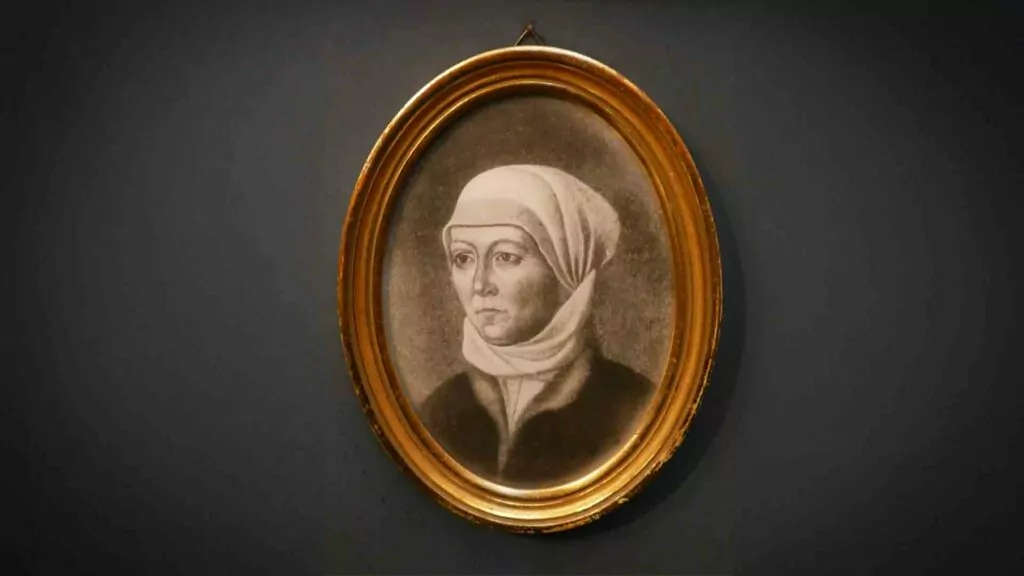“…the LORD your God is He who is God in heaven above and on earth beneath…” – Joshua 2:11
*****
In the house where one pays for love there arrived two young customers who had a different kind of business on their minds. They were engaged in espionage, nothing less: covert activities which required circumspect movements; activities that disguised their real intent, that even lead to the pretense of tourism, accentuated by a trip to the establishment of the local prostitute.
They had been sent out by the master of strategy, Joshua the son of Nun, one of the two survivors of an earlier spy mission some forty years ago. At that time the economic intelligence gathering yielded interesting results, but the military intelligence had been devastating for an unbelieving generation. It took forty years to purge the nation of that element of destructive disbelief: they were all buried in the sands of the desert.
Forty years of grave digging, forty years of sighing about “the wind passing over it, and it is gone, and its place knows it no more,” (Ps. 103:16) as one of their offspring, David, would later sing. Then, at last, even Moses died; the LORD Himself took care of the funeral arrangements.
Some safe house!

Rahab hiding the spies in the flax.
But now a next generation had come forth, the covenant had been renewed, and with it came a new willingness to serve, as these young men demonstrated, arrayed in their disguises. They were in the business of gathering information, and for information, they searched.
This woman they met was ready to give answers to questions that had not even been raised. And so, notwithstanding the surroundings of ill repute, they had come to the right address; this too was of the Lord. Maybe they did not realize it, but they ended up in what the spy industry calls a “safe house.”
“Some safe house,” one might mutter; hardly had they bedded down then that the local constabulary arrived for their arrest! Had the woman ratted on them? They were instructed, “to view the land, especially Jericho” (Josh. 2:1). Had they been too obvious in their observations of the land, even in their disguises? Were their questions reported?
Thinking fast
What do you do when soldiers come with their raucous order: “Open up in the name of the law!”? How do you respond to the gruff demand: “Hand them over, those enemy agents that we know came to your house!”? What do you do? Do you panic? Do you deny the obvious?
In times of war and threats of war, house searches are not always conducted under the sanction of a warrant, the validity of which one could politely argue so as to gain some time to contemplate one’s next move.
But here was a woman who did not panic, who did not need to stall for time. Had her trade made her skillful in leading men astray? She surely knew how to forestall a house search! She was, likely, more than a little coy when she assured them that, indeed, these men had come to her, you know these things happen in an establishment like mine, and they left not so long after they arrived, and that is not unusual in my profession either. And you tell me they were spies? Wow!
Then, in a conspiring manner, she might have whispered, “They can’t have gone far; they went that-a-way. Run after them and you’ll be sure to catch up with them.”
The path she pointed out to the soldiers seemed to be clear route towards promotion in rank, and maybe even a decoration.
The gates were opened for them and the gates were shut again after them, and the pursuers of Israel’s heroes chased after wind.
The “white lie”
Through the years much has been theorized and debated about the possibility of “white lies.” It seems that up until World War II most commentators agreed that a deception like the one performed by Rahab was still, in itself, a sinful act.
But during the war many persons of great integrity suddenly faced Nazi soldiers and their loud demand: Aufmachen, Polizei!! “Open up, it’s the police!” Since then the condemnation has not been so outspoken any more. Those who managed to lead the authorities down the garden path showed no remorse when later they admitted to have given their deceptive testimony. In fact, they were rather gleeful to report how several Jews were saved, the consequence of a gullible interrogator. There are some amusing anecdotes about those days.
The scene in the book of Joshua is not without humor either, enhanced by this preposterous elaboration: “so the men pursued after them on the way to the Jordan, as far as the crossing points…” (Josh 2:7). You could almost hear the eager conversations between then: how pleased the captain would be when they brought the spies in, and how proud their wives would be when their men would have their medals pinned on them. And then, gradually, the conversation slowed until finally they muttered: Where on earth are those fellows?
But the readers of Joshua know where those fellows were all along: right there, hidden under the flax on the roof! Yet, “the men pursued them,” Joshua said seriously. What a joke!
Prostitute and now traitor?
All this may seem somewhat goofy, worthy of an occasional chuck, but yet… couldn’t we say that Rahab the whore had now added to the abominable character of her profession the sordid crime of high treason? She had joined in with the enemy camp! If we think back to World War II again, who would have anything to do with someone who stooped that low?
However, is that verdict fair? Should she be displayed in the marketplace, shaven, shorn, and tarred, to have all the passersby spit on her?
“The love of country is inborn in every citizen,” it is said. We know all about that. During wars opposing armies claim: “We have God on our side.” How convincing are the speeches of the leaders! How strong the conviction of their followers! “With honor and valor we fight for our cause, with God on our side.” It has been repeated over and over at wreath-laying ceremonies.
But inside this woman something had changed. Was she aware of Noah’s curse over Canaan? Who were those gods that were supposedly on their side? Wasn’t it to demons that they offered their sons and daughters? The cruelty of those evil forces! Then, in total contrast, there were the stories of this large nation trekking through the desert, the children of Abraham. There was a cloud to guide them by day and a fire by night, she was told.
Those were the manifestations of an entirely different God – One who loved His people, who was like fire around them to protect them, who rained bread from heaven to feed them, and who let them drink from the rock. True, He punished them for their evil doings, but He still upheld them and destroyed their enemies before them. Who knows, but that some wandering minstrel might have come by with fragments of the song of Moses “…the Lord will vindicate His people and have compassion on His servants…” (Deut. 32:36).
This God was not like the demons who belong to the netherworld. He was the God in heaven above and on the earth beneath.
But in His holy nation, would there be a place for her, daughter of the accursed Canaan, a woman who had availed herself of the profits of fornication?
From rebel to child of God

Rahab helps the spies climb out over Jericho’s wall.
But then this wonder took place, as miraculous as creation itself: according to His decree, God softened her heart and inclined her to believe. At the same time the crisis of possible detection having been forestalled, she ran up the stairs and blurted out her confession: “I know that the LORD your God is He who is God in heaven and on earth beneath.”
Would a critical onlooker find that confession a bit meager? It is probably fair to say that she wouldn’t have passed an exam in systematic theology. All we know is that in that confessed faith she bargained with the two representatives of God’s holy nation: their safety for her and her family. They made a deal and it was confirmed by oath. The last words reportedly from her mouth were: “Amen, so be it” (Josh 2:21).
Of these actions, undoubtedly recited through the ages, James, the leader of the church at Jerusalem, would later make honorable mention, listing them in one breath with the great works of faith by father Abraham (James 2:23-25).
So it was that the first major strategic undertaking of Joshua, the son of Nun, seemed to have been upset by the tardiness of the spies. What kind of secret agent accomplishment was that, to bed down in a house of ill repute, to sneak through a window, to hide three days in the caves? Not a very good start, was it?
Yes, true, it did not seem like much, but out ways are not God’s ways. Just look at the valuable intelligence they received out of the hands of a woman chosen by God: “Truly the Lord has given all the land into our hands; and moreover, all the inhabitants of the land are fainthearted because of us” (Josh 2:24).
God’s ways are not man’s ways

…and the walls came tumbling down.
The preparations for the battle of Jericho, seen from a military point of view, seemed to be directed towards a total disaster. When the first encounter with a fortified city is to take place, what military exercises come up front? Stamina-building drills? A mock attack? Special wall-climbing exercises?
None of that happened. Instead, the sign of the covenant was administered (Josh. 5:2-9). All the army was circumcised. The effect of adult circumcision was that the army was sapped of its military strength for days. If the enemies were to find out…
But thus it pleased the LORD to fulfill all righteousness. And stranger yet, a patch of ground within view of Jericho was declared holy territory, where the military leader of Israel met the commander of the mighty host of the LORD (Josh. 5:13-15). Joshua, the son of Nun, was in this very peculiar way made ready for battle: he had to take off his shoes.
Now Jericho, known for its mighty men of valor, was sealed up tight ready to defend itself behind its fortified walls with whatever strength still remained within its armed forces. So, we would say: “Time for action. Get on with it! Let the battle start…”
But then again the events took a weird turn. Instead of an attack, there was a solemn procession around the city: seven priests blowing horns, followed by the Ark of the Covenant, and after that, the army detachments. No shouting, no banging of drums, no belligerent songs. Only the mournful sound of the seven rams’horns. The army followed silently; it was an uncanny show. Once this was accomplished, everybody headed back to their own camp and the deathly silence returned. The following days it happened again, and the next day again, and again. And every time the procession came by the house of Rahab the whore the people saw the scarlet cord hanging out of the window. And every time Rahab the whore looked out of the window and saw this strange procession going by, her heart beat wildly in anticipation. The battle of the Lord was taking shape and she had taken His side, or rather, He had taken her on His side. Now it was going to happen: the Hour Zero approached rapidly. The tension was building to an unbearable level.
Finally, on the last day the procession around the city was repeated several times over, till the final trip was made and the horn blowing ended. There was a short moment of utter silence. Then the trumpets sounded their dramatic long blast, and the whole scene erupted into turmoil. The entire army gave off a loud shout, a howl of derision for the enemies of God. After that a rumbling came up, as bricks and mortar split apart, as boulders cracked and rolled away, and in their course felling and crushing the hapless defenders. Then the walls of the city fell upon them, and the ruins of the structures covered them. And through the clouds of dust, over the rubble, clambered the victorious armies of God, in endless waves, to fulfill the command of total destruction.
Total destruction? Yes, the city was devoted to the LORD for destruction. Nothing was to be spared. Nothing except…
The war correspondent in Joshua 6 first passes on the direct order as it was given: destroy everything. Everything, except the house of Rahab the whore. Reason for the exception? She hid the spies.
Then follows the narrative: as instructed by General Joshua, the young spies went into the one remaining structure of the ring-wall. It was marked with the crimson cord. Spitting out the gritty dust of the ground granite that made film on their lips, they egged on the occupants: “hurry, hurry, quick this way to safety!”
Finally comes the recap, the summing up of the total victory: the city was burned with fire. The vessels of bronze and iron were put into the treasury of the house of the LORD.
End of report?
No!
Again it is stated, and now with greater emphasis yet, that Rahab the whore and her father’s household, and all who belong to her were saved alive. “And,” concludes the report, “she dwelt in Israel to this day.”
Why?
“Because she hid the messengers, whom Joshua sent to spy out Jericho,” that’s why.
In the Hall of Fame
In the hall of fame of the heroes of faith, there is a long wall lined with portraits. Hebrews 11 leads us through it. There is Abel, all scarred up, but still speaking through his faith. And look, there is Noah, that ridiculous shipbuilder on dry ground, but therefore heir of the righteousness that comes by faith. See Sarah there, laughing, because at age ninety she still conceived, and God had made laughter for her…
And then…yes, indeed there she is. Rahab the whore. Even now the title of her terrible profession is still etched on the copper plate that carries her name. But her features seem familiar. Haven’t we seen her somewhere before? Yes, of course, the evangelist Matthew listed her in the genealogy as a not-so-immaculate mother of Christ! The company some people keep!
Look at the strange smile on her face. After all those centuries, does she still think that sending those poor soldiers on a wild good chase was rather funny? Frankly speaking, it really was funny, but it seems that the smile is not about that. No, this is a fond smile, a smile caused by amazement and expressing great love. How could she, daughter of the cursed Canaan, and practicing prostitute, how could she possibly have ended up here, among these great ones in the kingdom of Christ?
Indeed, there is every reason for amazement. Here was one woman who came in last, totally unworthy, not even qualifying for the crumbs of the dogs, and yet she was given a seat of honor up front by her Great Son, the Christ, through the eternal love with which He loved her before the foundation of the world.
If that does not make you smile, what else would?
In this reflection the author wants to direct us back to the text to look at it with new eyes – an oh-so-familiar story startles us once again when viewed under this different light. But like any commentary on Scripture, it shouldn’t be read instead of the text itself. Read on its own, it could become confusing as to what are the author’s thoughts, and what the text actually says. So an important follow-up then is to read Joshua 2-6. This is a slightly edited version of an article that first appeared in the December 1993 issue. John de Vos was the very first editor of Reformed Perspective.











